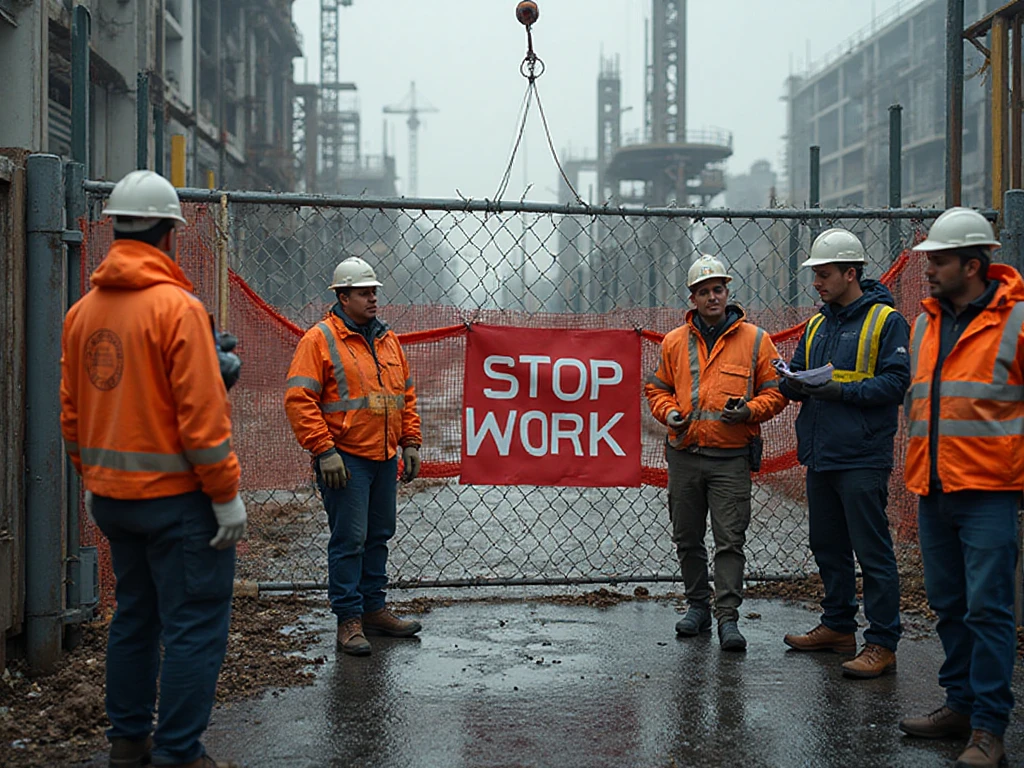NCA Contractor Registration Requirements: A Complete Guide for Contractors in Kenya
The NCA contractor registration process is mandatory for anyone seeking construction work in Kenya. Here’s a step-by-step guide on requirements, fees, and renewal.
A Guide to NCA Contractor Registration
In Kenya’s rapidly growing construction industry, compliance with the National Construction Authority (NCA) is not optional; it’s the law. Every contractor, whether local or foreign, must undergo NCA contractor registration before bidding for or executing projects. This registration ensures that only qualified contractors handle construction works, protecting clients from poor workmanship and safeguarding the industry’s integrity.
Understanding the contractor registration requirements, categories, and renewal process is crucial for contractors seeking to join or remain active in the sector. This guide provides a step-by-step guide to NCA contractor registration in Kenya, including the documents required for NCA registration in Kenya, how to check your status, and the penalties for operating without registration.
Why NCA Contractor Registration Matters
The NCA was established under the National Construction Authority Act to regulate and streamline construction activities. Registering with NCA:
- Legitimises your business operations.
- Provides an official NCA compliance certificate for Kenya.
- Grants access to government and large private construction contracts.
- Ensures accountability and professionalism within the construction sector.
Unregistered contractors risk legal penalties and exclusion from lucrative projects—making NCA contractor registration a non-negotiable step for serious players.
A Step-by-Step Guide to NCA Contractor Registration in Kenya
- Create an Account on the NCA Portal
- Begin by visiting the NCA Portal and selecting contractor registration.
- Use the NCA portal login and contractor application process to create an account.
- Fill Out the Online Application Form
- Provide details such as company name, directors, contact information, and specialization category.
- Select your preferred class (ranging from Class 1 to Class 8).
- Upload Required Documents
The following documents are required for NCA registration in Kenya:
- Certificate of Incorporation/Business Registration.
- PIN Certificate and Tax Compliance Certificate from KRA.
- CR12 form (for companies).
- Company profile and CVs of technical staff.
- Academic and professional certificates of technical staff.
- Proof of previous projects (if available).
- Payment of Registration Fees
Fees vary depending on the NCA categories of contractors. Class 1 contractors pay higher fees than Class 8, which is the lowest class category.
- Verification and Approval
Once submitted, the NCA reviews your documents. If successful, you’ll be issued an NCA compliance certificate in Kenya, which authorises you to operate legally.
NCA Categories of Contractors
Kenyan contractors are classified into eight categories, with Class 1 being the highest and Class 8 the lowest.
- Difference between NCA Class 1 and Class 8 contractors:
- Class 1: Can undertake mega projects worth billions of shillings (unlimited).
- Class 8: Limited to small-scale projects with lower capital requirements.
This classification guarantees that contractors exclusively undertake projects for which they possess the necessary financial and technical resources. Below is a detailed categorisation of all NCA registration classes.
Tables: Categories of Registration According to Value Limits
- Contractors (Building Works)
| CATEGORY | VALUE LIMIT (KSHS) |
| 1. NCA1 | Unlimited |
| 2. NCA 2 | Upto 500,000,000.00 |
| 3. NCA 3 | Upto 300,000,000.00 |
| 4. NCA 4 | Upto 200,000,000.00 |
| 5. NCA 5 | Upto 100,000,000.00 |
| 6. NCA 6 | Upto 50,000,000.00 |
| 7. NCA 7 | Upto 20,000,000.00 |
| 8. NCA8 | Upto 10,000,000.00 |
2 Electrical/Mechanical Engineering Services
| CATEGORY | VALUE LIMIT (KSHS) |
| 1. NCA1 | Unlimited |
| 2. NCA 2 | Upto 250,000,000.00 |
| 3. NCA 3 | Upto 150,000,000.00 |
| 4. NCA 4 | Upto 100,000,000.00 |
| 5. NCA 5 | Upto 50,000,000.00 |
| 6. NCA 6 | Upto 20,000,000.00 |
| 7. NCA 7 | Upto 10,000,000.00 |
| 8. NCA8 | Upto 5,000,000.00 |
3 Roads, Water, and Other Civil Works
| CATEGORY | VALUE LIMIT (KSHS) |
| 1. NCA1 | Unlimited |
| 2. NCA 2 | Upto 750,000,000.00 |
| 3. NCA 3 | Upto 500,000,000.00 |
| 4. NCA 4 | Upto 300,000,000.00 |
| 5. NCA 5 | Upto 200,000,000.00 |
| 6. NCA 6 | Upto 100,000,000.00 |
| 7. NCA 7 | Upto 50,000,000.00 |
| 8. NCA8 | Upto 20,000,000.00 |
How to Check Contractor Registration Status with the NCA
To confirm if a contractor is registered:
- Visit the official NCA Website.
- Navigate to the “Check Contractor” section.
- Enter the contractor’s registration number.
This process enhances transparency and helps clients avoid working with unregistered contractors.
The NCA License Renewal Process and Fees in Kenya
Staying compliant isn’t a one-off task. The NCA renewal process in Kenya is annual and tied to your licence anniversary date. We recommend initiating your renewal 30–45 days in advance to prevent any last-minute issues, portal queues, or project disruptions.
A. Step-By-Step Renewal (What to Do on the NCA Portal)
- Log in to the NCA portal
Use your company account (the one used for your first NCA contractor registration). Choose Renew Contractor License and select your works category (Building, Specialist, or Roads/Water/Civil).
- Update company profile
Confirm the legal name, physical address, county, contact person, email, phone, and PIN. Ensure the CR12 (for companies) is current (it is often requested within the last 3–6 months).
- List technical personnel
Add/refresh details for key staff: names, roles, ID/PIN numbers, academic/professional certificates, IEK/EBK/EPRA/NITA registrations (if applicable), signed employment contracts/appointment letters, and up-to-date CVs. NCA confirms that you still meet the contractor registration requirements for your class.
- Report projects
Provide a summary of ongoing and completed projects: project title, client, location, contract sum, scope, dates, and status. Attach evidence where available (award letters/LPOs, completion certificates, photos).
- Declare plant & equipment
Upload logbooks (owned) or valid lease/ hire agreements (leased), plus inspection/calibration certificates for critical equipment. This supports your selected class and categories.
- Financial & tax compliance
Upload your current KRA Tax Compliance Certificate, recent bank statements, audited accounts (as applicable to class), and county business permit. Some classes require proof of insurance (e.g., WIBA, public liability).
- Health, Safety & Environment (HSE)
Attach the HSE policy, safety plan, staff HSE training (toolbox talks, inductions), and site risk assessments. NCA is keen on demonstrable HSE capacity regardless of class.
- Pay renewal fees
Fees are class-based (higher class = higher cost). Expect fees per category if registered in multiple categories (e.g., Building + Roads). The portal generates a bill and supports common channels (e.g., M-Pesa/bank).
- Submit & track
After submission, the application shows “Pending Review.” Monitor your dashboard for queries. Respond quickly to avoid resets or rejection.
- Download your certificate
Once approved, download your NCA compliance certificate for Kenya as a PDF. Please share it with clients, display it at your offices, and attach it to bids.
Tip: Keep a renewal folder (cloud or local) with evergreen documents (CR12, TCC, staff contracts, equipment proofs) plus a reminder system so you’re never scrambling at the deadline.
B. Fees: What to Expect (And How to Plan)
- Class 1 contractors pay the highest renewal fees; Class 8, the lowest.
- Each work category (Building, Specialist, Roads/Water/Civil) attracts its fee.
- Budget for bank charges/M-Pesa fees, and set aside a 10–15% buffer for incidental document updates (e.g., new CR12, new staff letters, extra notarisations).
- Renewal fees and rules can change; always confirm the current fee schedule on the NCA portal before payment.
C. Timelines and Common Pitfalls
- Typical processing is 5–15 working days if documents are clean.
- The most frequent delays include expired TCC, missing staff evidence, outdated CR12, lapses in equipment proof, and unpaid fees.
- Should you change class (upgrade/downgrade), please be prepared for more thorough scrutiny and occasional site verification.
Penalties for Unregistered Contractors in Kenya
Operating without a valid NCA registration (or an expired licence) puts you at serious legal and commercial risk.
A. Legal and Administrative Consequences
- Carrying out construction works without registration can result in fines and/or prosecution under the NCA Act.
- Suspension, downgrading, or deregistration may occur due to non-compliance, misrepresentation, or repeated breaches.
- Future public opportunities are blacklisted, and some private developers replicate public blacklists.
B. Project and Commercial Risks
- Project stoppage orders are at the site level; the county or NCA may halt works until compliance is proven.
- Contract termination or non-payment by clients discovering your licence has expired/is invalid mid-project.
- Insurance claims may fail if an incident occurs under an unregistered or suspended licence.
- Financiers (banks, SACCOs) and major suppliers often demand valid NCA certificates for credit lines.
C. How to Regularise (If You Lapse)
- Cease the new work immediately and inform the client you are regularising.
- Log in to the NCA portal, file a renewal or fresh application, and pay any required penalties.
- Respond promptly to compliance queries and attend hearings or site verifications if requested.
- Document internal fixes (e.g., hiring qualified staff, acquiring or leasing required equipment).
- To help rebuild trust with our clients, please share your reinstated certificate and update your tender files.
Documents Required for NCA Registration Kenya (Expanded Checklist)
Use our master checklist to assemble a first-time application or a clean renewal. Some items vary by class and category; the NCA portal flags what’s mandatory for you.
A. Company Identity & Legal Status
- The Certificate of Incorporation/Business Name (sole proprietor/partnership/company) is required.
- CR12 (companies) – current (often within 3–6 months).
- National IDs/Passports for proprietors/directors/partners.
- KRA PIN for the entity and directors/partners.
- County business permit (current).
- Company profile (scope, history, organisation chart, key policies).
B. Tax and Financial Capacity
- KRA Tax Compliance Certificate (valid).
- Audited financial statements (as applicable to your class) or recent bank statements.
- Proof of insurance (e.g., WIBA, public liability), if requested for your class/works.
C. Technical Staff (Prove Competence and Contracts)
- The staff list shows roles aligned to your class/category.
- Academic/professional certificates (diploma/degree/trade test).
- Professional registrations where applicable (e.g., IEK/EBK/EPRA/NITA).
- Signed employment contracts/appointment letters and CVs.
- Staff KRA PINs and passport photos.
D. Plant and Equipment (Owned/Leased)
- Logbooks for owned equipment; lease/hire agreements for hired equipment.
- Inspection/calibration certificates for testing/critical equipment.
- Photographic evidence and equipment schedule (type, capacity, quantity).
E. Projects and Performance
- Project references (award letters/LPOs/contracts).
- Completion certificates or progress reports for ongoing works.
- Client recommendation letters, if available.
F. HSE and Quality
- HSE policy and site safety plan (risk assessments, toolbox talk templates).
- Training records (inductions, PPE issuance logs).
- Environmental compliance documents where relevant (e.g., NEMA approvals).
G. Foreign/Temporary Applicants (If Applicable)
- Work permits for expatriate staff.
- Joint venture agreements with local NCA-registered firms (as required by project conditions).
- Project award/contract showing scope and duration.
Pro tip: Build a shared drive for evidence (by year and renewal cycle) so your NCA renewal process in Kenya is a quick upload—not a fire drill.
Key Benefits of NCA Contractor Registration
You are ready to kickstart your dream contract after fulfilling your NCA contractor registration requirements in Kenya. Therefore, it is not just a regulatory requirement and endorsement that keeps you moving; there are other derived benefits, as we have highlighted below:
A. Market Access and Growth
- Many procurement companies in Kenya require an active NCA compliance certificate at the time of submission and at the time of award to be eligible for tenders in public and large private projects.
- Visibility on the NCA contractor register, making due diligence by clients easier (and faster approvals for your company).
- Ability to upgrade class over time (Class 8 → Class 1) as your capacity grows.
B. Credibility and Risk Reduction
- Signals professionalism and capacity—you meet the contractor registration requirements for your class.
- Lower regulatory risk (fewer site stoppages or compliance disputes).
- Smoother financing and insurance—lenders and underwriters prefer compliant contractors.
C. Operational Confidence
- A structured framework for staffing, equipment, HSE, and quality, which improves project delivery.
- Access to industry training and regulatory updates that keep your systems current.
- Easier subcontracting relationships—prime contractors prefer compliant partners.
The bottom line is that treating NCA contractor registration as a living system (not a once-a-year chore) raises your win rate, protects margins, and keeps sites productive.
Conclusion: Building Your Future Starts with NCA Registration
The NCA contractor registration process is more than just compliance — it is a gateway to credibility, growth, and opportunities in Kenya’s construction industry. By following the step-by-step guide to NCA contractor registration in Kenya, meeting the contractor registration requirements, and keeping up with the NCA renewal process in Kenya, contractors secure a stronger position in a competitive market. Whether you are a startup contractor or an established firm, prioritising registration ensures industry compliance, professionalism, and sustainability.
Stay Ahead in Construction Compliance
To succeed in Kenya’s construction industry, contractors must always remain compliant and proactive. Visit ConstructionFrontier.com for more detailed insights, professional updates, and expert guides on compliance.









